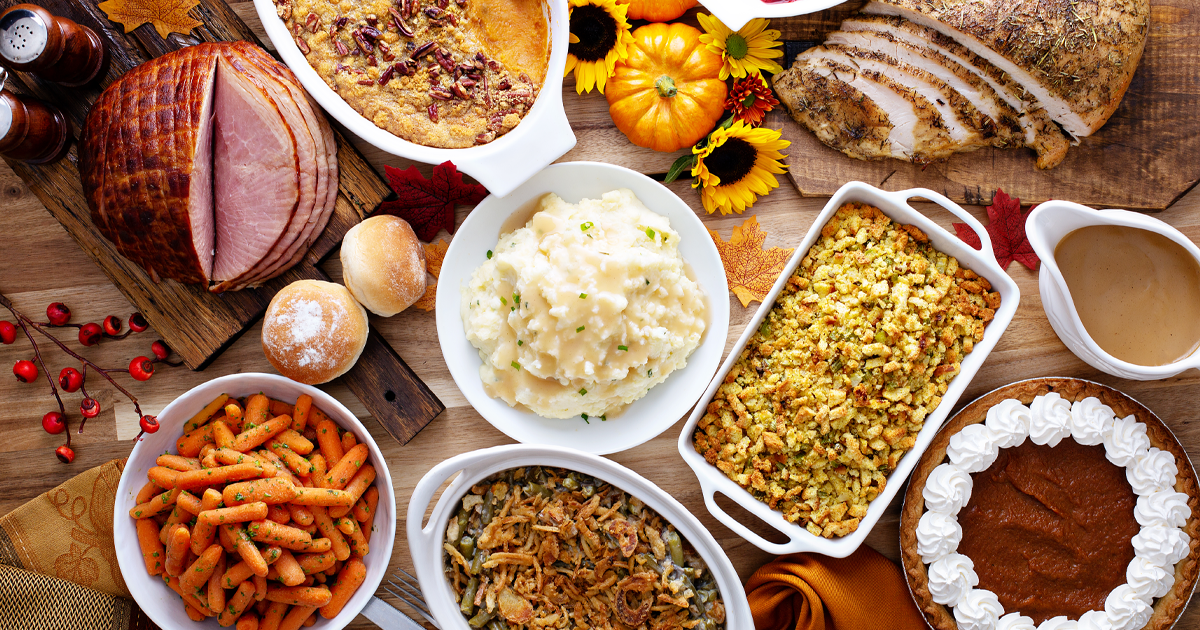Thanksgiving Every Day
“In everything give thanks, for this is God’s will for you in Christ Jesus.” – 1 Thessalonians 5:18 (NASB)
Two young men in the Canton, Ohio area had a brilliant idea. What if every day was Thanksgiving? What if traditional Thanksgiving food was always on the menu? The turkey and gravy, mashed potatoes and gravy, noodles and gravy, dressing/stuffing floating in gravy, green beans, sweet potatoes, cranberry sauce, and all the rest of the trimmings? And don’t forget the pumpkin pie. With the labor-intensive preparation required to create a “from scratch” Thanksgiving dinner, cooks seldom roast a twenty-pound turkey outside of November. But if a restaurant could offer such a menu? Voila! TGD (ThanksGiving Every Day) was born, now renamed American Oven Homestyle Kitchen.
While we may not regularly want to experience the post-dinner stupor that a belly full of turkey can produce, we can benefit from the “every day is thanksgiving” philosophy that the young entrepreneurs chose as the guiding principle for their endeavor. The Apostle Paul made it clear that gratitude is to be a consistent part of the Christian life. In his letter to the Ephesians (5:20), he admonished his readers to “Sing and make music from your heart to the Lord, always giving thanks to God the Father for everything, in the name of our Lord Jesus Christ” (NIV). Paul wrote a similar challenge:
“In everything give thanks, for this is God’s will for you in Christ Jesus.”
1 Thessalonians 5:18 (NASB)
Catholic writer Henri J.M. Nouwen described this way of life as having the discipline of gratitude. “Gratitude goes beyond the ‘mine’ and ‘thine’ and claims the truth that all of life is a pure gift. In the past I always thought of gratitude as a spontaneous response to the awareness of gifts received, but now I realize that gratitude can also be lived as a discipline. The discipline of gratitude is the explicit effort to acknowledge that all I am and have is given to me as a gift of love, a gift to be celebrated with joy.”
As both the Apostle Paul and Father Nouwen understood, a life of gratitude doesn’t just happen. There is an intentionality to it, an active movement rather than a passive acceptance. We deliberately look around us, acknowledging with James that “every good and perfect gift comes from above” (James 1:17). We open our mouths with “psalms, hymns and spiritual songs” (Ephesians 5:19) to direct our gratitude to God. We practice expressing our thanks to one another, seeking for words to affirm rather than criticize.
Yet what about when we just don’t feel like being grateful, often with good reason? We’re bereft, unable to keep from staring at the empty chair at the Thanksgiving table. We sit alone, with a Styrofoam container on our TV tray, cutting into a piece of turkey roll with congealed gravy. We eat our turkey inside the penitentiary dining hall, angry at ourselves, the system, and those who have abandoned us. We long to be sharing a festive meal in our own home, but Harvey, Irma, or Maria robbed us of that opportunity. A brother betrayed our family, a dear friend seduced our child, a family is torn apart. There’s no room for gratitude in the heart.
Even then, in the worst of times, we can choose the discipline of gratitude. Writing in The Return of the Prodigal, Nouwen challenges us:
“Gratitude as a discipline involves a conscious choice. I can choose to be grateful even when my emotions and feelings are still steeped in hurt and resentment. It is amazing how many occasions present themselves in which I can choose gratitude instead of a complaint. I can choose to be grateful when I am criticized, even when my heart still responds in bitterness. I can choose to speak about goodness and beauty, even when my inner eye still looks for someone to accuse or something to call ugly. I can choose to listen to the voices that forgive and to look at the faces that smile, even while I still hear words of revenge and see grimaces of hatred.”
Here’s how Ann Voscamp explains:
“Murmuring thanks isn’t to deny that an event isn’t a tragedy and neither does it deny that there’s a cracking fissure straight across the heart. Giving thanks is only this: making the canyon of pain into a megaphone to proclaim the ultimate goodness of God.”
The ability to choose gratitude even when we think we cannot is the costly yet extravagant grace of the gospel. Because of grace, thanksgiving every day isn’t limited to turkey and gravy in a local diner; instead, the discipline of gratitude allows the thread of thankfulness to weave its way through the joys and sorrows of daily life. Until one day, we will stand before the throne of God, and will know the discipline of gratitude in all its fullness as we sing with all the saints:
“Blessing and glory and wisdom and thanksgiving… to our God.”
Rev. 7:12
JoAnn Streeter Shade is a retired Salvation Army officer. She co-authored “To Be Continued . . . Women, Ministry, and Retirement” with Major Lauren Hodgson.







